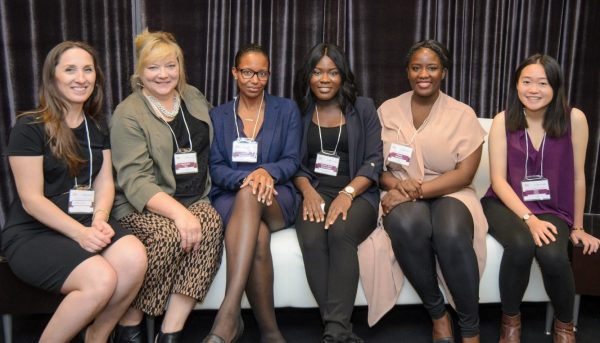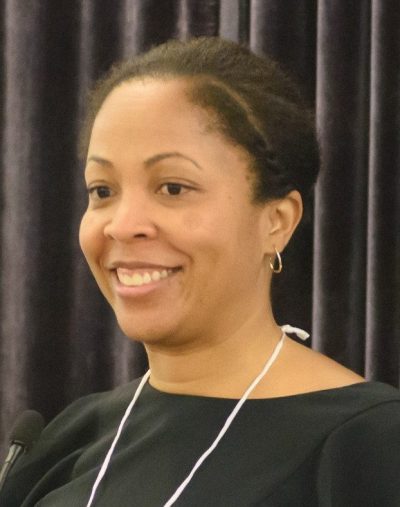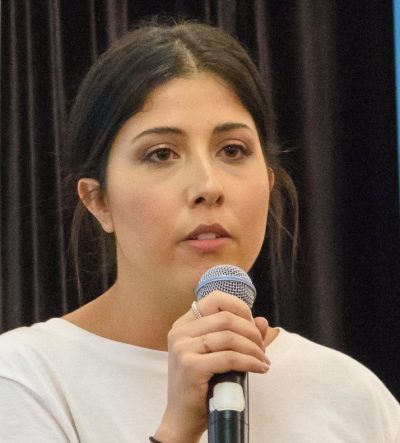Farah Qaiser, Policy & Politics co-editor
Throughout 2017, gender, diversity and inclusivity in science, technology, engineering and mathematics (STEM) fields has been a contentious topic. The Naylor Report marked it as an issue that needs immediate attention in academic circles, and this year’s male-dominated Nobel prizes, followed extensively in the news, underscored the problem. The leak of a Google employee’s anti-diversity memo and the flawed Benefit Cosmetics slogan ‘Skip Class Not Concealer’ sparked off furious discussions on social media.
On October 14, in Toronto, hEr VOLUTION hosted the Canadian Women in STEM Conference to address the issues of gender, diversity and inclusivity in STEM. This post highlights the key ideas discussed by the speakers, panellists and audience on the day, but I’ll dive deeper into the issues raised in a future post.
hEr VOLUTION is a non-profit organization that creates opportunities for youth – with a focus on young women from under-represented communities – in STEM. hEr VOLUTION invited speakers at different stages in their careers (from PhD students to established professionals) to share their journeys through STEM in 15-minute TED-style talks, dubbed STEM talks.
The speakers shared a common refrain: they called on the audience to speak up and tackle the challenges facing women in STEM. I was particularly struck by the speakers’ passion, and their persistence throughout their science careers. While I can’t recount all of their stories, here are some memorable quotes from a few of the speakers:
Emily Agard, Director of SciXchange, Ryerson University
“It’s not all about everyone necessarily needing to have a direct career in science, but everyone should have access to science, feel welcome in a science environment, not be afraid of science, apply science in everything that they do, and use science to make policy-based decisions.”
Natalija Pavic, Enterprise Sales Engineer, Salesforce Solutions
“There’s a train that runs through all of our education, and every step of the way, women fall off the train of their math education […] The way we are teaching math today is not conducive to gender equality.”
Brittany B. Campbell, PhD student, Arthur & Sonia Labatt Brain Tumour Research Centre, University of Toronto
“What keeps women out of science I think is the ‘death-by-a-thousand-cuts’ phenomenon. It’s low-level, persistent, constant – it’s not very outright, like you’re a woman, get out of here. It’s a lot of things that just make you very tired.”
Samantha Yammine, PhD student, Department of Medical Genetics and Microbiology, University of Toronto
“Women are socially conditioned to be competitive with one another […] Don’t do that. It’s a bad experiment to ever compare yourself to another person. You don’t have all of the data on their end, but you have all the data on yours. [There are no] proper controls – [it’s] bad science, don’t do it.”
The event also included a panel discussion moderated by hEr VOLUTION founder, Doina Oncel. It included Dr. Imogen Coe (Dean of the Faculty of Science, Ryerson University), Angella Mignon-Smith (Candu Energy), Vanessa Enem Takim-Ndifon (Apotex Inc.), Dilesha Stelmach (Green Shield Canada) and Vicki Chen (Riverdale Collegiate Institute).

Panel members Doina Oncel (hER VOLUTION founder), Imogen Coe, Angella Mignon-Smith, Vanessa Enem Takim-Ndifon, Dilesha Stelmach, and Vicki Chen. Photo courtesy of Chanaka Bandara
Here are some of the main points from the hour-long panel discussion:
- Gender, diversity and inclusivity are not just Human Resources (HR) issues – they should be intrinsic to every company’s culture. HR can recruit applicants with a diversity quota in mind, but this does not ensure that the company itself has a welcoming environment or is the right fit for the individual. Panellists pointed out the need for companies to hire with an awareness of implicit bias. For example, is HR taking into account the bias against non-white sounding names on CVs, and taking steps, such as removing names from applications, to give all applicants a fair chance? It’s equally important to consider implicit bias in the hiring process, even in an automated system, since screening algorithms can be as biased as the coders who write them.
- Men need to be part of this conversation. Audience members suggested shaping the discussion as a money problem to explain the benefits of gender, diversity, and inclusivity in the workplace, and how it can help generate “cold, hard cash”. Secondly, the panellists agreed that the “blame game” has to be stopped. Not all men are aware of the challenges women face in STEM – marketing is critical for overcoming this. Unfortunately, events such as the Canadian Women in STEM conference are seen as women only – they aren’t seen as a place for men to come and engage in vital conversations.
- Women – and their supporters – need to be bold when discussing sensitive matters such as gender, diversity and inclusivity. Support and/or backlash will come from everyone – including parents, family members, friends, co-workers, and bosses – but it is necessary to constantly make sure that people are aware that the lack of diversity and inclusivity in the workplace is a problem. The presenters were all great role models in this regard.
As for where the discussion of gender, diversity and inclusivity is heading, one thing is for certain: we need to stop focusing on simply getting women into STEM. As Coe said in the panel discussion: “It’s not about getting women into STEM – it’s about keeping them there.”
–30–
All photos in this post are courtesy of the photographer Chanaka Bandara. The banner image is courtesy of hEr VOLUTION.








